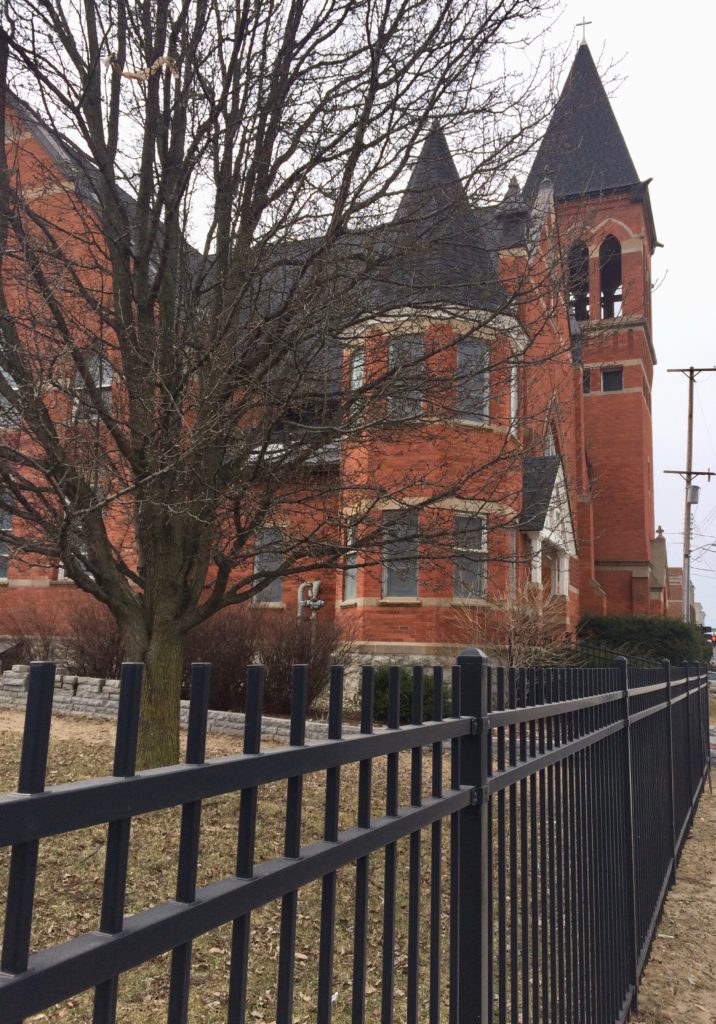
Court Street United Methodist Church (Photo by Jan Worth-Nelson)
By Jan Worth-Nelson
On Sunday, March 3, the week after the international governing body of the United Methodist Church voted to retain language excluding LGBTQ people, Rev. Jeremy Peters took to the pulpit at Court Street United Methodist Church and preached a sermon titled “God Loves All People: Bruised and Dimly Burning.”
Outside, on the church’s sign, were the words “God Loves All People–All Means All.”
That statement is part of the creed of the congregation of the Court Street church, a venerable downtown landmark built in 1894 whose members tend to be socially progressive. To Peters, Pastor Christy Miller-Black, choir director David Lindsey and the rest of the 400-member-plus congregation, the statement “All Means All” has never been more significant or more painfully relevant.
The Court Street mission, declared on its website, is, in part, “to create a world with more peace and more hope by loving one another as Jesus loves us.”
Yet in light of acrimonious divides within the denomination, that mission, which the congregation interprets as calling for inclusion, seems to put Court Street in the thick of a debate about what exactly is meant by Christian love. It’s a struggle being played out not just within the governing body of the United Methodist Church — with seven million members, the second largest Protestant denomination in the country — but within hundreds of Methodist congregations around the world.
At a February meeting, about 1,000 delegates to the denomination’s General Conference in St. Louis voted by a slim majority to retain a 47-year-old statement from the church’s “Book of Discipline” — its policy manual, so to speak — declaring “The practice of homosexuality is incompatible with Christian teaching.”
Ironically, Peters explained in an interview, that statement was added in as a compromise in 1972 following a push by a group of liberal Methodists in the wake of the 1960s civil rights and gay rights movements. A principle approved that year read that “All people regardless of sexuality are people of sacred worth.” It was, he said, part of an attempt to acknowledge “we have long had gay clergy, gay bishops, gay lay leaders in our churches. It was a moment of social change and a time when people wanted to articulate that the LGBTQ community was part of who we are as a church.”
But following pushback from church conservatives, the second statement was added as a “nevertheless”:
“Nevertheless, the practice of homosexuality is incompatible with Christian teaching.”
Discussion of the removal of that statement came to a head at the General Conference in 2016. Following the conference, two opposing plans, a “Traditional Plan” and a “One Church Plan” were developed, competing for denominational acceptance. Things got hot and so complicated that a special meeting in St. Louis was set up exclusively to consider those alternatives.
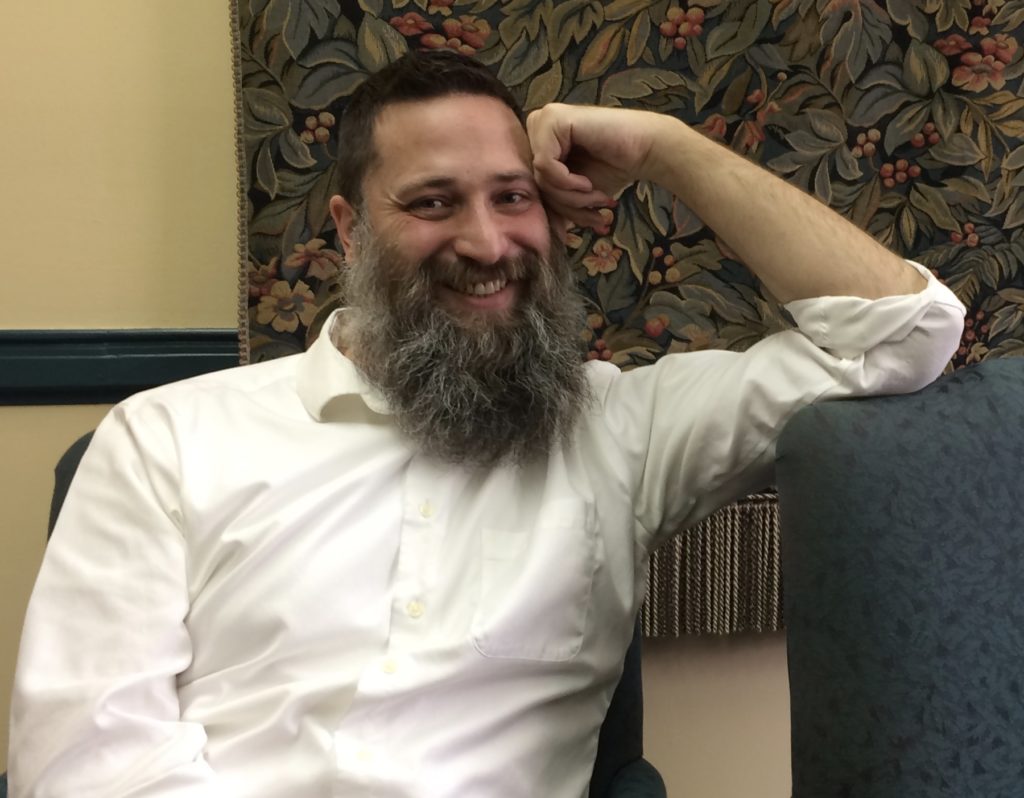
Pastor Jeremy Peters (Photo by Jan Worth-Nelson)
The February vote to retain the “incompatible with Christian teaching” language, in the “Traditional Plan” by 53 to 47 percent, was accompanied by new wording punishing pastors officiating at same-sex weddings, calling for a suspension on the first “offense” and termination on the second. Also, although there now are numerous gay Methodist clergy around the country — and even a gay bishop — they must not be in a partnership–and must not be “practicing” — that is, they must remain celibate.
This puts not just progressive UM congregations around the country, many of whom have long defied the prohibitions, into a head-on collision with the denomination but also imperils progressive pastors, like Peters and Miller-Black.
Peters and Miller-Black said they are sad, broken-hearted and grieving.
And for each of them, the moment is personal as well as collective. Peters grew up Methodist in the Upper Peninsula, going to church camp every summer and becoming a self-professed “Bible nerd.” His devotion to the church and to a theology and ministry of love and inclusion have been intense and lifelong.
A graduate of Albion College and the Duke Divinity School at Duke University in Durham, NC, he has been at Court Street for three and a half years.
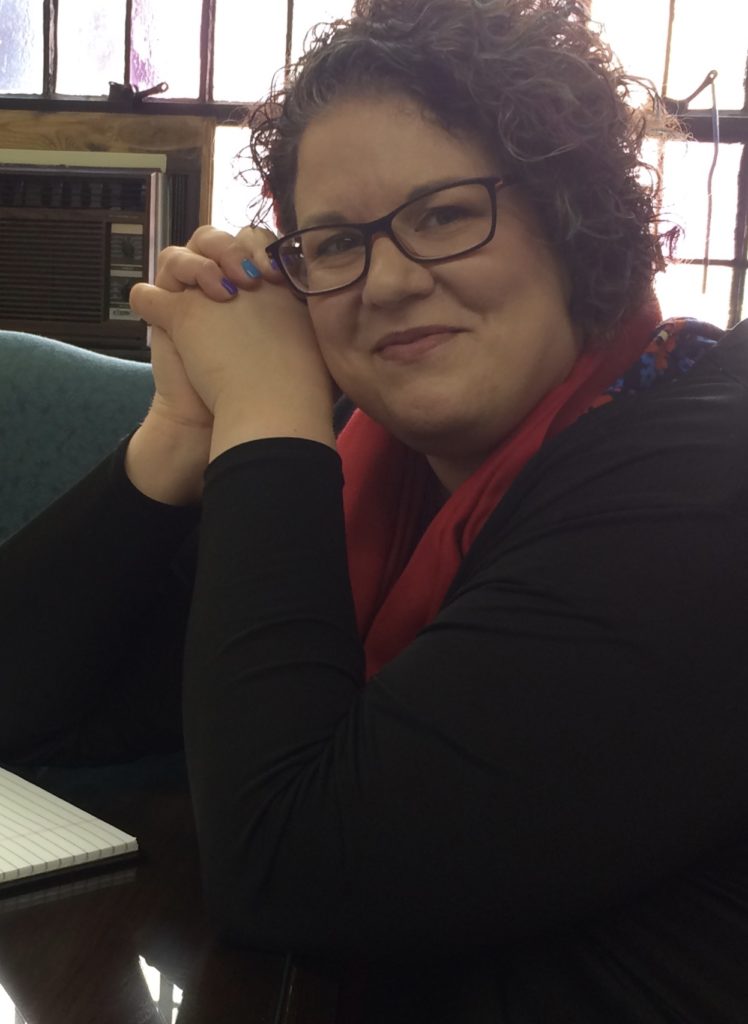
Pastor Christy Miller-Black (Photo by Jan Worth-Nelson)
Miller-Black began her religious life as a Nazarene and left that church when she was denied ordination because of her gender, she was told–making the current situation particularly painful. She went to seminary at Garrett-Evangelical Theological Seminary in Evanston, IL and has been at Court Street for about two and a half years.
“When I became a Methodist 15 years ago I honestly felt that the wide range of theological beliefs found within the church was our strength,” Miller-Black said. “I have found in the years that followed that the UMC seems to have lost the ability to listen to different points of view.
“We have fallen into the same trap of the rest of the world by creating ‘us vs. them’ terminology and have failed to see that all of us are unique and beautiful children of God. The inability to hear one another and work together have led us to the place we are now,” she said.
“Part of what was so painful was that this felt like we were rejecting part of our identity as a denomination,” Peters said. Noting that it was Methodist founder John Wesley who first asserted it is possible for Christians to “agree to disagree,” Peters added, “that’s always been our ethos…and yet this vote means that if you disagree, you are going to be removed–you are going to be rejected.”
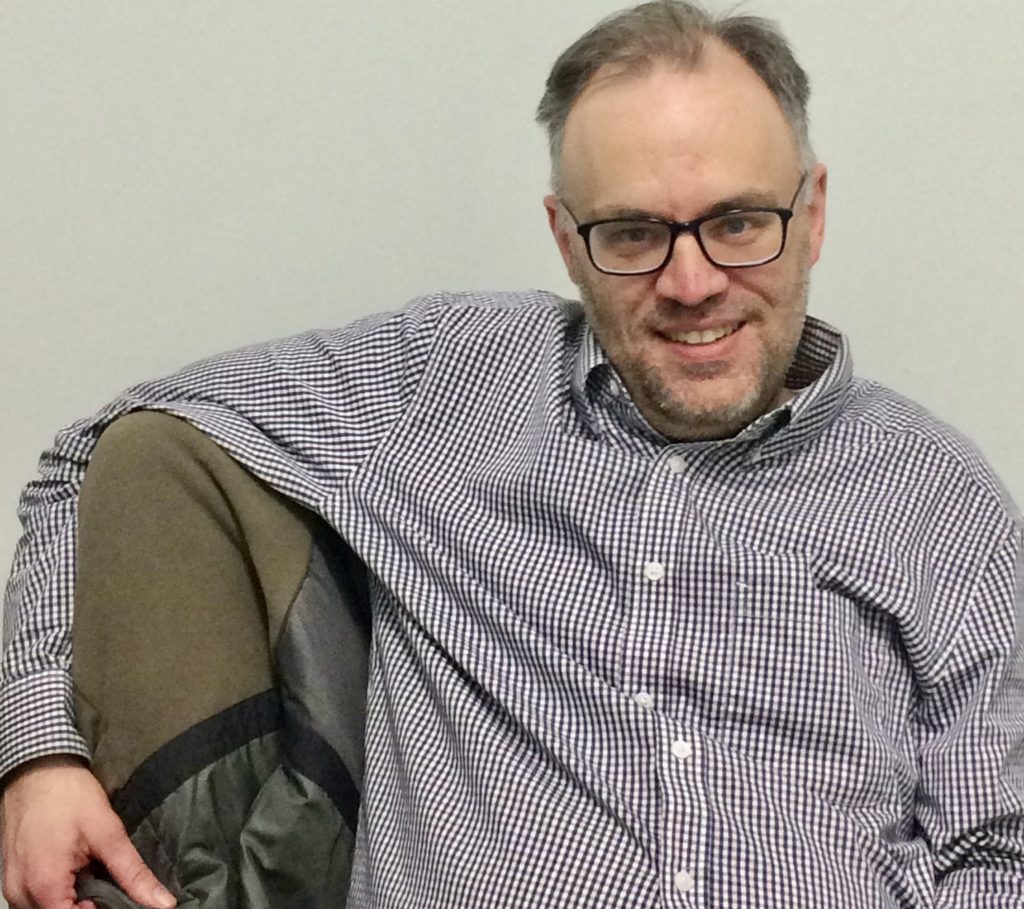
David Lindsey (Photo by Jan Worth-Nelson)
David Lindsey, Court Street choir director, grew up in the Emanuel United Methodist church in Flint–a family connection going back three generations. He graduated from UM – Flint before attending Westminster Choir College in Princeton, NJ. After coming out as gay at 21, he struggled with finding a place in the church community, always relying on music as his anchor. At 50, while not in a partnership, he has found a home in the Court Street community, which he regards as family. He says there are least a half dozen LGBTQ members in the choir and many more in the congregation.
“I am very, very angry and upset at the United Methodist Church,” Lindsey said. “I love my church family, but that’s different. As a gay man the fact that if I were to want to become a pastor, it would be difficult — or if I wanted to get married–well, I would want to get married in my home church and be married by my pastor.”
In an interview two weeks later, Peters said the service the Sunday after the vote, March 3, was “incredibly moving and powerful–it’s not a morning I will ever forget.” He and Miller-Black scrapped all their previous plans for the day and started from scratch.
“We pastors have learned that there are people who have been deeply wounded by the church, have been rejected by the church in ways that have left marks and scars,” Peters said. “We felt like that morning we needed to confess that and ask forgiveness from people who have been hurt by the church.”
He said the sermon that day was about pain.
“Last weekend my church had an opportunity to show grace to one another, to make room for each other at the table, to say we are going to continue to be a church where people are free to disagree, can agree to disagree, to start to bring some healing to the hurt we’ve done to LGBTQ persons for the the last 47 years,” he confessed to the congregation.
“But that’s not what we did. Instead we voted for more prohibitions and stricter penalties..and in doing that we hurt an awful lot of people.”
Peters said several studies show that for LGBTQ youth, in particular, the church is “the most dangerous and most unhealthy place for them to be…It can be deadly to be part of faith community that doesn’t affirm your sexuality or your gender identity.”
He offered three central messages:
1. I am sorry. as a pastor, as a leader in the UM church…I am sorry. for all the times the church hurt you in the name of Jesus. I’m sorry people made you feel unwelcome and small because of your sexuality and your gender identity.
2. Thank you. In every church I’ve ever served there have been LGBTQ members who lead worship, who serve the church, who build up the community even when the UM Church has made it painful for you to be here — you have stuck with us, and I call you a miracle of God — you are the living embodiment of the graciousness and love of Jesus Christ.
and finally,
3. Churches will let you down, pastors, conferences, denominations–but Jesus will never let you down. When the church becomes painful, know that he will find you wherever you are. That’s the Jesus I have in mind.”
The service ended with David Lindsey, Miller-Black, Peters, and the choir singing “Child of God,” a hymn written by Mark Miller, a gay Christian. The video of what all three described as an intensely emotional moment has gotten 19,000 hits on Facebook so far, Lindsey said.
While Peters said he can’t speak for everybody in the congregation, he described “a remarkable unity here at Court Street, a unity in grief, a unity in disappointment, and in the desire to say we’re going to do something different. We’re going to do something new.”
What that means is being considered — in round table meetings after the church service, in preparations for observing Pride Month in June, in bringing in a gay speaker, one of the delegates to the St. Louis meeting, to preach.
“There are going to be a lot of rainbows around here,” Peters said.
The contested language and its consequences do not go into effect until 2020, Peters and Miller-Black point out, and the matter will be brought before the denomination’s judicial council in April.
It is complicated — though the impetus toward prohibitions around homosexuality comes from “a group of well-organized, well-funded American Christians, mostly located in the Bible Belt,” according to Peters, that movement also is strongly supported by Methodist churches in Africa, some of whom are operating in countries where homosexuality is illegal.
Thus the debate has complex cultural and international implications for a denomination which established missions in Africa 150 years ago; further, UMCOR, the United Methodist Committee on Relief, has long worked to eliminate malaria and respond to international disasters. Lindsey said he fears if the denomination breaks up over the “One Church Plan” schism, those efforts might be damaged or lost.
In a Los Angeles Times article March 19 summarizing the debate, a Liberian bishop said the Methodist Church in Africa is “growing by leaps and bounds because we are committed to biblical Christianity,” adding that if United Methodists become more “permissive” of homosexuality “the church in Africa would cease to exist.”
An Ohio conservative pastor, Keith Boyette, who leads a group believing a pastor should have sex only if he or she is in a heterosexual marriage, asserted in the same article, “It’s not just the issue of human sexuality that divides the church. We’re divided on the authority and interpretation of Scripture…we’re divided on what constitutes sin.”
Methodist congregations, liberal and conservative, are weighing their options. As the LA Times article puts it, “A denominational split would have enormous consequences, including questions over property rights, clergy pensions and the church’s constitution.”
In Flint, Peters and Miller-Black aren’t sure what the future holds. But the local congregation seems ready to move forward with a practice of greater inclusion. .
“We will continue to be a place where everybody is really welcome – all races, creeds, special needs – we want to still be that place, no matter what our denomination does,” Miller-Black said.
“Across the board, I don’t know of anyone at Court Street that would say we are allowed to be unkind or unloving towards others – they may disagree theologically with some things, but the general unity that we love people is absolutely across the board. If you’re uncomfortable, come talk to us about it…we agree to disagree, and to find a way to hold on to the bigger things that keep us together.”
Peters said attendance is “way up” the last few weeks.
“People don’t want to miss out on the conversation. There is already a sense of momentum,” Peters said. “I think they are saying, ‘I don’t want to lose my church.’ ”
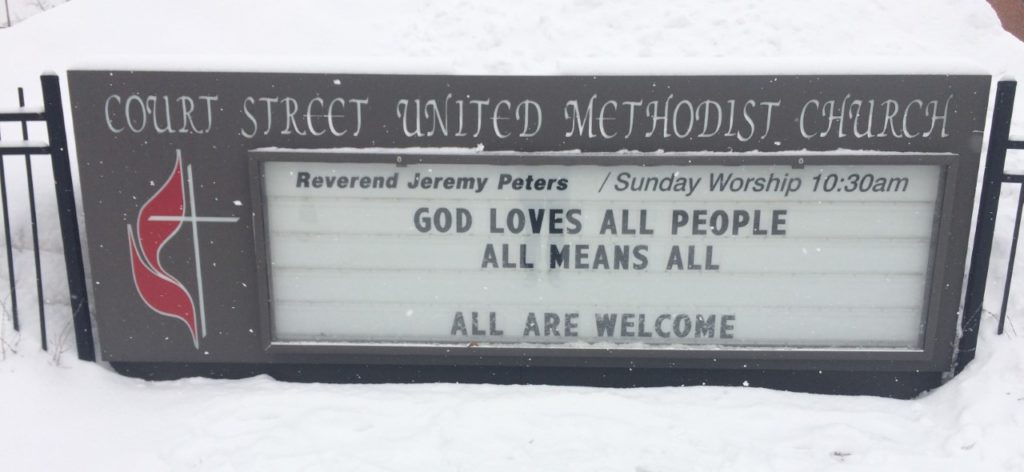
This declaration, part of the Court Street church’s creed, went up the week after the denominational vote (Photo from the Court Street UM Church Facebook page)
Editor’s Note: This story has been updated to note that the Court Street United Methodist Church was built in 1894, not 1902, when an addition was built. Also, Jeremy Peters has clarified that the push toward more prohibitions were propelled not by the African churches, but by “a well-organized, well-funded group of American Christians, primarily in the Bible Belt.” The African churches have strongly supported those prohibitions, however, Peters said.
EVM Editor Jan Worth-Nelson can be reached at janworth1118@gmail.com.

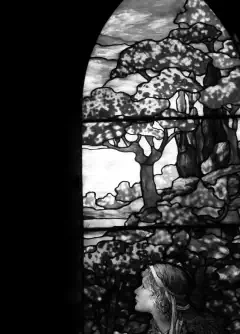
You must be logged in to post a comment.